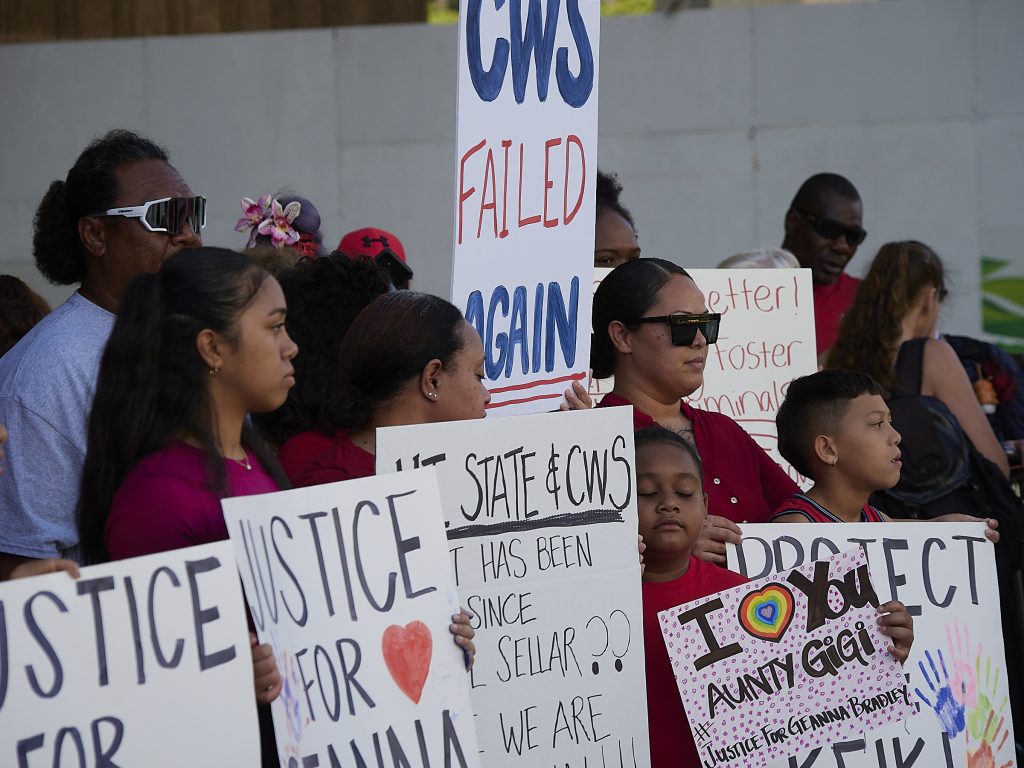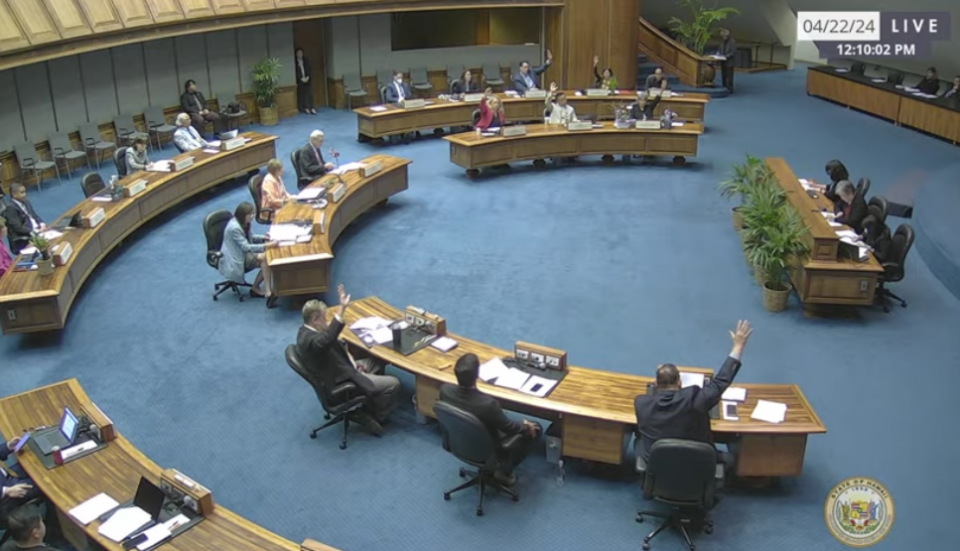Much remains unknown about the long-term effects of deep-sea mining in the Pacific and its role in the greater climate crisis. Given that, activists, governments and the private sector support a 10-year moratorium on deep-sea mining.
Yet the Republic of Nauru has made its intentions clear: Within two years, it will start mining the deep sea of the Clarion Clipperton Zone.
The CCZ — between Hawaii and Kiribati, extending eastward towards Mexico — is just one area of interest for mining outfits, covering 4.5 million square kilometers of the Pacific.
The area is filled with seamounts and deep-sea mountains, home to minerals including manganese, cobalt and several other elements integral to batteries that power smartphones and electric vehicles, among other things.
Governments, such as the Cook Islands, along with private mining outfits, are also looking to do exploratory work in their own waters, which has caused concern due to the unknown fallout.

Mining the deep sea involves the harvest of tennis ball-sized nodules scattered across the sea floor up to four miles below the surface. The nodules are sucked up to ships from the seafloor with vacuum-like machines and sifted from the sediment, which is then pumped back into the water.
Plumes of sediment are created by the machines as they negotiate the sea floor. In addition, the sediment that goes back into the water after sifting spreads before settling again on the seafloor. A recent modeling study has shown that the plumes could spread for hundreds of miles from the mining site, in all directions.

“With all this type of research, there’s a lot of assumptions that need to be made, because we know mining hasn’t happened. So we don’t know what it’s going to look like,” said Daniel Wagner, ocean science technical advisor for Conservation International, an international environmental nonprofit. “The potential implications for impact are enormous.”
Anti-mining advocates often say more is known about the moon and that science needs time to catch up. Wagner says research commissioned by mining outfits is biased.
Wagner has been researching deep-sea ecosystems for several years, and continues to discover new species of coral in the Pacific Crust Zone, another area targeted for exploration. These deep-sea ecosystems have developed over tens of thousands of years or more, while the nodules attracting prospectors are older than humanity itself, he said.
The coral reefs are “not like weeds or grasses that might, if you cut it, they will come back. They are more like redwood forests in that if you remove it, it’s basically permanently gone,” Wagner said. “They grow very slowly, they reproduce very slowly … They’re not equipped to withstand impact.”
These deep sea corals are important sinks for carbon. In addition, the ecosystems hold potential importance for humanity in other ways. Early Covid-19 vaccine testing included the use of enzymes found in these habitats.
“It’s really important that we know before we take any major decision in terms of strip-mining an area,” Wagner said.
While all nations have power over their own waters, the International Seabed Authority regulates the floor of international oceans and has been working on the regulatory framework of deep-sea mining. It first signed contracts for exploratory work for 15 contractors in 2001, mostly in the CCZ, under the United Nations Law of the Sea. It has granted 30 exploratory contracts to date.
Andrew Friedman, who leads the Deep Sea Mining Project at The Pew Charitable Trusts, said the regulatory framework had been hastily formulated, faster than science has been able to understand the deep sea.
Nauru triggered the two-year rule — a Seabed Authority regulation that its members can use to signal intent to mine under whatever regulations exist two years later.
Since then, advocates and scientists have voiced concern that the framework’s development being expedited would compromise the integrity of any future agreement. The International Union for Conservation of Nature, in its World Conservation Congress in September, voted overwhelmingly against it.

Friedman said all nations should have their concerns heard and addressed in the regulations but feared that was not the case.
Communities and conservationists throughout the Pacific are voicing opposition not only to plans to mine the CCZ, but also their own or neighboring nations’ waters. Fiji’s prime minister — with Ni-Vanuatu and Papua New Guinean support — called for his fellow Pacific states to implement a 10-year moratorium on seabed mining.
But for nations like the Cook Islands and Nauru, the prospect of “economic salvation” was enough to convince them exploration was worth it, according to Maureen Penjueli of the Pacific Network on Globalisation, a regional watchdog organization focused on Pacific autonomy. The group feared Nauru’s use of the two-year rule trigger could create a domino effect of other cash-strapped nations.
Mining was presented positively in Nauru and, without much grassroots advocacy to counter it, the idea of mining a plot in the CCZ was perceived as a distant issue, said Penjueli.
In the Cook Islands, however, the Te Ipukarea Society, an environmental nongovernmental organization, has recently completed a nationwide public awareness program in which it visited all but one of the country’s 15 islands, in an effort to set the record straight on mining following a government-run public relations campaign.
The government’s outreach on deep sea mining had been focused on boosting and diversifying the economy, on top of contributing to the green, low-carbon economy, led by Prime Minister Mark Brown. A panel is currently entertaining proposals to explore, not mine, the Cook Islands’ cobalt-rich seabed. A decision could be made by the year’s end.
“They talk about the benefits that come from deep-sea mining, which are of course financial,” said Kelvin Passfield, the society’s technical director. “They do mention that there are risks, but they really glaze over the risks. We highlight the risks: The main risk being that we don’t know what the impacts will be at this stage.”
Despite political criticism of Te Ipukarea Society’s message, most Cook Islanders were receptive, Passfield said. But the opposition Democratic Party this year nonetheless expressed its support for deep sea exploration.

The society has been pushing the government to impose a minimum 10-year moratorium on deep-sea mining, to better understand its environmental implications. But the government has stated its granting of exploration licenses demonstrated a measured approach, which it hoped would quell climate concerns, Passfield said.
“The government says that there needs to be more research. We want research by independent organizations that aren’t actually likely to rush things,” said Passfield, adding that it was “common sense” to hold off.
Asian Development Bank estimated the country’s gross domestic product would contract by 26% in 2021, with its tourism-dependent economy being decimated by the pandemic. A 2016 report on mining estimated the economy could benefit from $43.2 million of new revenue. The country’s total GDP in 2020 was just $384 million.
In the government’s view, the potential economic benefits of the cobalt-rich seabed mean money for infrastructure, better health and education facilities and a generally prosperous nation.
The deep-sea mining initiative comes as the Cook Islands are in a uniquely precarious economic spot – tourism has plummeted and its fisheries are no longer a reliable source of income because of fluctuations in fish stocks.
In 2017, the Cook Islands protected Marae Moana, an area covering all of its waters. The environmental project put the nation’s reputation “at an all-time high,” but the government’s amenability to mining companies changed everything, according to conservationist Jacqueline Evans.
Evans, who was director of the Marae Moana project and won the Goldman Environmental Prize, was fired from her government role after calling for a moratorium on deep-sea mining in 2018. Though mining was never taken off the table during the implementation of Marae Moana, it was always perceived to be a far-off issue, Evans said.
“Our reputation was ruined,” she said.
With bipartisan support for mining and a stifled economy, the future seems set for the Cook Islands. Yet Cook Islands residents still consider the ocean tremendously important to their culture and wellbeing, and any environmental fallout would face massive backlash, said Evans.
“Although it says in our legislation that licenses can’t be issued if there are environmental risks,” Evans said, “I’m concerned that the threshold for environmental risks will be lower for the panel than it is for the people.”
While the seafloor nodules are attracting corporate interests to the Pacific islands, which have all suffered from a tourism downturn, there is a growing fear over potential liabilities if exploration or mining work goes awry.
Deep-sea exploration in Papua New Guinea, run by the Canadian outfit Nautilus Minerals, made international headlines after its project ran aground due to insufficient funding. In the meantime, sharks dispersed when the work was being done, leaving Papua New Guinea communities struggling to continue their cultural practice of harvesting sharks. Papua New Guinea invested almost $106 million in the failed project.
“There’s this ongoing debate on who stands to benefit from this. Ultimately they (Pacific nations) will be the last to benefit and they will be left with the liability,” said Penjueli of the Pacific Network on Globalisation.
“We have to take a guess on the level of harm that we can deal with,” she said.
In the Cook Islands, Evans continues to question the integrity of her country’s Seabed Minerals Act, which sets a framework for exploring deep-sea mining. In an Oct. 9 letter to the Cook Islands News, Evans raised concerns unaddressed by the government, including how the nation would defend against potential legal challenges. She also called for a referendum.
In a response to Evans in the same paper, Seabed Minerals Commissioner Alex Herman wrote, “Where valid concerns are raised, including by Ms. Evans, the Authority will publish those questions and responses for the public … I will not be responding to further letters to the editor, particularly those containing sensationalist statements.”
The Cook Islands Seabed Minerals Authority did not respond to questions.

“Obviously it’s unfortunate that some countries don’t have the luxury to plan or think about 20, 30, 50 years ahead,” Wagner, of Conservation International, said. “They have to be concerned about keeping the lights on today and tomorrow. And that’s always the problem: short-term economic benefits.”
Conservation International is one of many NGOs, nations, private corporations and regional groups calling for a moratorium. The United Nations has called for the 2020s to be the decade for creating a sustainable ocean, with calls for 30% of it to be protected by 2030. By then, the science will paint a clearer picture of the potential harm of deep-sea mining.
“The more we look, the more we find … At that point, it will be basically irrefutable,” Wagner said.
While some organizations have called for a moratorium, Penjueli’s Pacific Network on Globalisation called for an outright ban in 2017 following what happened in Papua New Guinea.
“Our position is that science is already very clear,” said Penjueli.
 Sign up for our FREE morning newsletter and face each day more informed.
Sign up for our FREE morning newsletter and face each day more informed.
Civil Beat is a small nonprofit newsroom that provides free content with no paywall. That means readership growth alone can’t sustain our journalism.
The truth is that less than 1% of our monthly readers are financial supporters. To remain a viable business model for local news, we need a higher percentage of readers-turned-donors.






